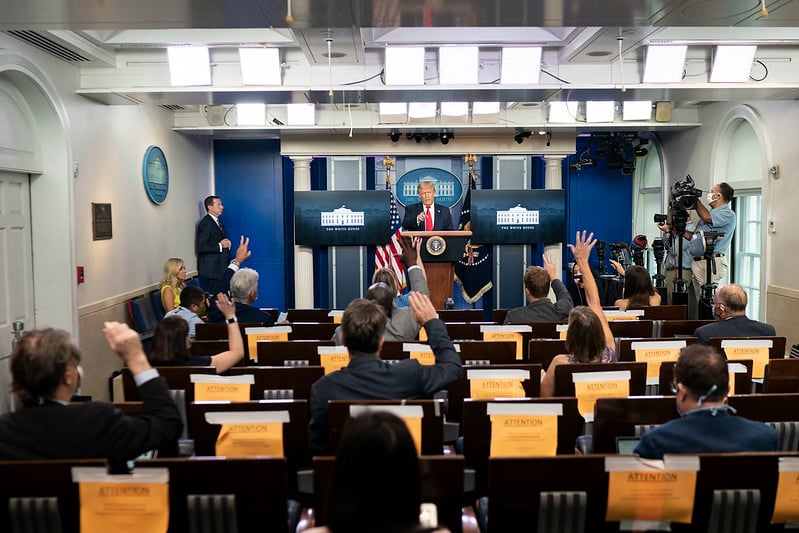There have been a lot of bad weeks in the Trump era—too many to count, in fact. The country has lived through days of rage over the death of George Floyd and days of grief as thousands of citizens contract a viral disease.
But consider the front page of the Washington Post this morning. The four corners of the broadsheet were a window into a dystopian world that is now ours. Here are the headlines:
“U.S. economy contracts at record rate.”
“Trump suggests delaying election.”
“Many economists urge Congress to ‘go big’ on next relief bill” (a story about how the Senate, unconscionably, is about to abandon millions of Americans on their unemployment checks).
“DHS gathers ‘intelligence’ on journalists covering [Oregon].”
“Mail backlog raises fears of delays in ballot delivery.”
“Nation’s unrest looms large as [Congressman John] Lewis is eulogized.”
If you had to choose just a single artifact to take back in time and wave in front of a voter in 2016, you’d be hard pressed to find a better one than today’s Post.
And that’s not counting the other soul-deadening events of the past five weekdays. Ruth Bader Ginsburg was back in the hospital. DC Public Schools announced that fall classes would again be virtual, dashing the hopes of parents who dreamed of sanity, and prolonging an ongoing disaster in childhood development.
Then, on Wednesday, 1,400 people died of Covid-19, marking the worst single-day of deaths in two months. On this solemn occasion, President Trump did not offer his condolences to the families. However, he did use his unsurpassed global-messaging platform to keep trying to persuade Americans against wearing masks, broadcasting to his followers the research of a woman who believes pharmaceuticals are made with alien DNA and that gynecological ailments are caused by women who dream of sex with demons.
This is indeed happening. In the United States of America.
But there are a few points of light in these headlines — dim, maybe, but still light. Two headlines in particular are worth plucking out in juxtaposition. The first is Trump’s baying about postponing the election. Some resistance liberals have seen this as the moment to sound the Ultimate Alarm, history’s last and final warning that “it can happen here.”
Yet not only is Trump’s threat empty (moving Election Day is literally not possible)—it’s very nearly worth celebrating. This is a signal of abject weakness, indicating that Trump has psychologically thrown in the towel before his party has even thrown its convention. As commentator Josh Marshall has written, the proper response should be to follow Saul Alinsky’s advice and deploy mockery and ridicule—because that’s what winning looks like. Sauron’s eye is wobbling. Responding with pearl-clutching over the death of the Constitution misses the mark, even if it may scratch our civic itch. As Marshall warns bluntly: “This is loser talk.”
What does winner talk look like? The oratory of champions? Look further down the front page at the service for John Lewis at Ebenezer Baptist Church. Eulogizing the civil-rights legend, former President Barack Obama delivered perhaps the best speech of his post–White House career. He eviscerated Republicans for doing everything they could to deny the vote to Americans. And he called on the country to pick up Lewis’s sword and shield.
“You want to honor John? Let’s honor him by revitalizing the law that he was willing to die for,” Obama said, calling for a new Voting Rights Act.” Obama continued: “Someday, when we do finish that long journey toward freedom, when we do form a more perfect union, whether it’s years from now or decades or even if it takes another two centuries, John Lewis will be a founding father of that fuller, fairer, better America.”
This is parainesis—honor for the dead, exhortation to the living. The task that faced Lincoln at Gettysburg was not so different from Obama’s, and ours: to take tragedy on the battlefield and make it somehow worthy of the fallen.


















